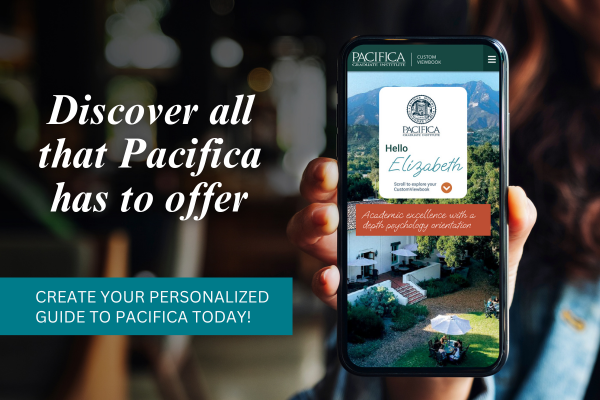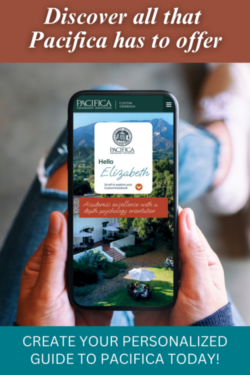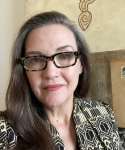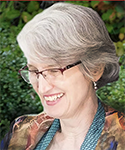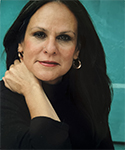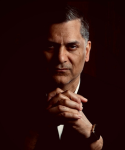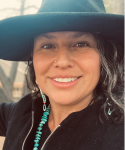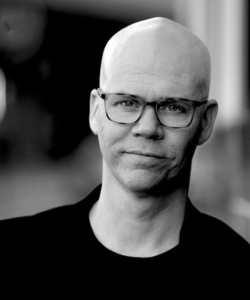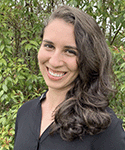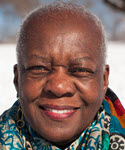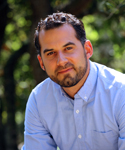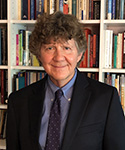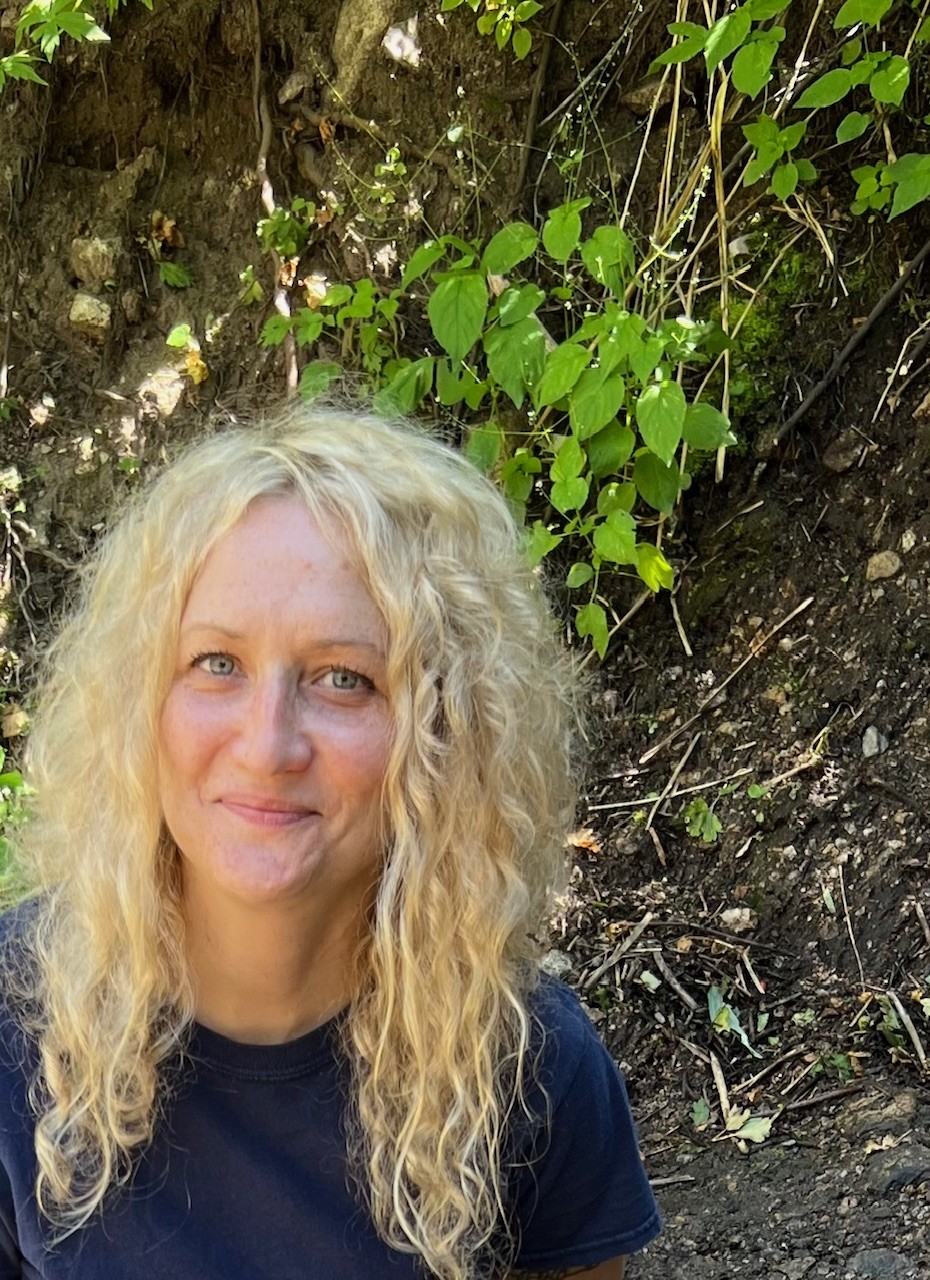M.A. Depth Psychology and Creativity with Emphasis in the Arts and Humanities
Now Accepting Applications for Fall 2025
This unique transdisciplinary program restores creative expression to its rightful place as an equal partner to rigorous intellectual exploration. Both invigorate and transform each other, allowing for new types of knowledge, innovation, and deep meaning to emerge. Our program creates a temenos, or sacred space, for an alchemical melding of mind, body, and soul. Our graduates create the new visions, stories, and “creative medicines” so necessary for our shared world.
Request More InformationM.A. Depth Psychology and Creativity with Emphasis in the Arts and Humanities
A Transdisciplinary Approach to Creativity & Soulful Scholarship
State Authorization: Click to View States Pacifica is Authorized to Enroll By Program.
Creativity is an enigma. As poet and psychoanalyst Clarissa Pinkola Estés has observed, it is a “shapeshifter,” a “dazzling spirit” that appears in all our lives while eluding our attempts to explain its radiance. C.G. Jung regarded creativity as a vital human instinct; a force akin to nature itself, which drives the unfolding and shaping of every life. Creativity is also a calling, one that makes its claim upon individuals who in turn devote themselves to crafting the stories, objects, and experiences that illuminate and transform our world. The knowledge-making traditions of depth psychology, the arts, and the humanities can inform and nourish every type of creative endeavor, including those dedicated to social justice, climate activism, and communal healing. In fact, the world itself has its own creativity, manifested in the archetypes of the collective unconscious, whose symbols, images, metaphors, and movements are the prima materia of our co-creative and inexorably interconnected lives.
The Depth Psychology and Creativity Program with Emphasis in the Arts and Humanities is a unique low-residency Master of Arts program that invites students to discover for themselves —and within themselves—the eternally rich sources of inspiration long-associated with the arts and humanities; including the study of mythology, philosophy, history, literature, and ecology as they inform the art and craft of living and working with deep purpose, enlivened creativity, and devoted service. Our program is built upon a transdisciplinary worldview, which blurs the artificial boundaries between disciplines. Transdisciplinarity is radically inclusive and non-hierarchical; this allows us to approach marginalized ways of knowing such as indigenous wisdom traditions, astrology, alchemy, and the sacred with the same depth as our commitment to great literature, visual art, film, performance, new media and the sciences. Students in this program learn strategies for tapping into the deep well of the collective unconscious as the ultimate source of creativity. In addition, students discover the value and necessity of working together in creative collaboration, which as reflected in the concept of emergence, inspires and influences new, and unexpected creative expression. Students also learn to enhance their inherent creative powers and aesthetic sensibilities through serious and prolonged engagement with the archetypal energies of the creative psyche.
Program Schedule
Our unique Hybrid program consists of four quarters per year, each made up of approximately 10 weeks of instructional time, not counting holidays and other breaks for rest, relaxation, and reflection. Students take two 3-unit courses each quarter. The first few weeks of each quarter are spent reading at home and engaging in discussion and activities with the faculty and one’s classmates using our online learning platform, D2L, and occasionally on short Zoom sessions. Students and faculty then gather on campus for a 4-day residential weekend (see the calendar below). These residential weekends begin on Thursday mornings at 8:00am and end on Sunday afternoons at 3:30pm. An average residential day consists of approximately eight-to-ten hours of on-campus instruction and group activities, including mealtimes and generous breaks. Students return home and back to D2L to continue reading, discussing, and completing final assignments.
Creativity as Inquiry, Artmaking as Soul-Making
This M.A. program’s approach is broad, highly transdisciplinary, and satisfying for those who seek to combine intellectual exploration with creative expression. Honoring Pacifica’s mission to tend soul in and of the world, the program emerges from the depth psychological perspective that artmaking is soul-making as it supports individuals who crave deeper levels of understanding and devotion in their creative lives. The program is designed for those who seek to live and work more intuitively, meaningfully, and expansively while fostering the same qualities in others. Artmaking (of all kinds) is also a powerful mode of research and knowledge-making. Arts-based research combines intellectual rigor with creative expression, encouraging dialogue between students and faculty with a focus on expanding our individual and collective potentials as contributors to the unfolding of a more just, vibrant, sustainable, and soulful world.
This program attracts individuals from the visual, performing, narrative, film, video, and media arts; advertising, marketing, architecture, fashion, and design; teachers of every grade level from K-12 to college, plus many from diverse and overlapping fields such as social work, community organization, corporate leadership, somatics, yoga, the healing arts, and ministry. A previous professional creative background is not required for admission.
A Unique Hybrid Program in a Magnificent Natural Setting
The M.A. program in Depth Psychology with Emphasis in the Arts and Humanities provides a dynamic and applicable education informed by depth psychology, literature, mythology, philosophy, and creative practice. The program’s unique learning format combines the best aspects of a connected, soulful, and transformative interpersonal experience with the convenience of distance-learning technologies.
Students work weekly in online classrooms and in their home environments. Additionally, once each quarter, students gather on Pacifica’s Ladera Lane Campus for a four-day weekend (Thursday, Friday, Saturday, and Sunday) in a retreat-style residential. During these on-campus sessions, students have access to the Institute’s extensive resources as they join like-minded creative individuals from around the world in a magnificent natural setting. The flexible hybrid format brings Pacifica’s graduate degree programs to global citizens and the life-long learners who otherwise might not be able to fulfill their educational calling.
Students in the M.A. in Depth Psychology and Creativity
- Discover strategies for tapping into the deep well of the psyche as a source of creativity.
- Study how the multifaceted discipline known as “depth psychology” emerged from the arts, humanities, spirituality, and ancient healing practices. Understand and advance depth psychology’s contributions to the lives and work of contemporary creative individuals.
- Cultivate their aesthetic sensibility and creative powers through deep engagement with the creative psyche, enhanced by the contributions of faculty and peers, great literature, film, artmaking, ritual, and spiritual practices spanning diverse genres, cultures, and periods of time.
- Find rich sources of inspiration in the humanities, including the study of mythology, philosophy, psychology, history, literature, and ecology as they affect the art and craft of living and working creatively and with purpose.
- Complete two substantial personal creative projects, along with smaller quarterly projects – all with the guidance of experienced and innovative faculty. (Creative expression combined with academic inquiry and writing is integral to our transdisciplinary approach and is encouraged in every class.)
- Receive a degree that expands their vocational options and opens up new career possibilities.
Contact the Admissions Advisor
- Katherine Bailey, Executive Admissions Advisor
- Phone (call or text): 805-881-1638
- Email address: kbailey@pacifica.edu
“Creativity happens at the crossroads of desire and dissatisfaction, longing and devotion – the place where we ourselves are being created. Join us as we re-member and revitalize our essential connections to this living, transformational force – not only for ourselves but for our shared and fragile world.”
Pacifica’s creative classrooms
Pacifica’s hybrid model of learning
Career Pathways
Graduates of this program pursue various creative, entrepreneurial, academic, and other career pathways.
Many graduates of the Depth Psychology and Creativity program are teachers in academic settings from K-12, Waldorf, and college levels. Others maintain mentoring/coaching practices while publishing books and journal articles for academic audiences as well as writing for general audiences. Still other graduates focus on public speaking, performance and workshop facilitation, including facilitating group experiences focused on key depth psychological perspectives on creativity, dreamwork, vocation, and healing practices. Our program has also attracted mature and emerging artists and makers from a variety of fields such as visual art, television, film, and theater. This group of graduates, including New York Times best-selling authors and Emmy award-winning writers and producers, apply their studies to their existing creative careers.
Featured Blog Posts
- World-Bridging and Shapeshifting: Touching Base with Mary A. Wood, Ph.D.
- The Soul Stands Ajar: Aesthetic Encounters as Portals to Wonder & Meaning
- Dionysus as God of Drama, Psychology, and Transdisciplinarity: Depth Psychology and the Arts with program chair Susan Rowland, Ph.D.
- A Subtle and Sacred Activism: Discussing Art and Poetry with Pamela Brown, PGI Artist in Residence
- Interbeing: An Interview with Gerui Grace Ma, Part I
- Interbeing: An Interview with Gerui Grace Ma, Part II
- Courting Psyche: An Interview with singer-songwriter Lori Jean, Part I of II
- Courting Psyche: An Interview with singer-songwriter Lori Jean, Part II of II
- Seven Senses: An Interview with Carol Makela
- Aesthesis: The Heart’s Response to Beauty, an Interview with Rebecca Sabine Ramsey
Scholarships
Global Innovators Scholarship Offered to newly admitted students entering into one of the following programs: M.A. Depth Psychology and Creativity, or M.A/Ph.D. Depth Psychology with Specialization in Jungian and Archetypal Studies. Average awards range from $2,000-$3,000. The number and amount of individual awards is contingent upon the number of eligible applications received. This scholarship is renewable provided recipients meet the required grade point average. Education Assistance The Education Assistance Scholarship is sponsored by Pacifica Graduate Institute and offered to new and returning students based on extreme financial hardship and strong academic excellence. Awards are made annually at the beginning of each academic year. The award is $1,000 to be equally divided over the academic year. This scholarship is not renewable, and students must apply each academic year. Students enrolled in the PhD and PsyD Dissertation phase of their programs are not eligible for scholarship consideration. Yellow Ribbon Matching Scholarship Pacifica Graduate Institute is pleased to announce that we have entered into an agreement with the Veteran’s Administration in support of veterans continuing their education under the Post 9/11 GI Bill. Pacifica has agreed to provide up to ten Yellow Ribbon Scholarships each year for qualifying veterans under the Post 9/11 GI Bill on a first-come first-serve basis. Students in the M.A. Counseling program will qualify for up to $6,500 per year, M.A. Depth Psychology and Creativity will qualify for up to $5,400 per year, and those in the doctoral programs will qualify for up to $7,800 per year.Chair & Faculty
The Faculty members of Pacifica’s M.A. in Depth Psychology and Creativity Program bring a passion for education and a wealth of real-world experience into the classroom. As leaders in the fields, the members of Pacifica’s faculty include authors of international acclaim, artists, filmmakers, renowned lecturers, practicing psychologists, active psychotherapists, and philosophers.
Request Information
Learn MoreProgram FAQs
What is a "hybrid" program?
A hybrid program combines learning in residential sessions with online video/audio lectures, assignments and writing. To be specific, each 3-unit course has 30 hours of contact time (time learning with the instructor). 55% of those hours are spent in residential, and 45% are spent using D2L, our learning management system.
What does a typical quarter look like?
Each quarter contains 10 weeks of instructional time, though they will extend longer to accommodate holidays and other breaks for rest, relaxation, and reflection. Students take two 3-unit courses each quarter. The first few weeks of each quarter are spent reading at home and engaging in discussion and activities with the faculty and one’s classmates in D2L and occasionally on short Zoom sessions. Students and faculty then gather together on campus for a 4-day residential weekend (see below). Students return home and back to D2L to continue reading, discussing, and completing final assignments.
What can I expect during the residential session?
Classes begin at 9:00 a.m. on Thursdays, and end at 3:30 p.m. on Sunday, in order to accommodate students who wish to travel back home that afternoon. Classes are in session from 7 to 9 hours a day, and faculty are encouraged to combine lecture, dyad work, student presentations, and group discussion with experiential and embodied learning to accommodate different styles of learning and to keep the day flowing. Students can meet with faculty one-on-one during lunch and dinner breaks, and every session contains an opportunity to meet as a group with the program’s director to address concerns, raise questions, or discuss how the program is progressing for them.
The daily sessions will oftentimes extend to 8:30 or 9:00pm. These after dinner gatherings consist of special events, forums, film screenings, guest speakers, and social time for the entire cohort.
How much time should I expect to be on D2L?
Students are expected to log in to our learning management system (Desire2Learn) several times a week, for a total of approximately two to three hours per week. Fulltime engagement (consisting of two classes per quarter) typically can be accomplished in 8 to 10 hours per week. This includes time spent posting and responding on the discussion boards (as just described), reading from the texts assigned, listening to an audio file, or watching a video, though there may be other activities as well.
Experience has shown that hybrid students have a tendency to spend more time per week “in class” than students who attend monthly sessions. We have several measures in place to protect our hybrid students from this imbalance, including designating a “preparation week” when students and faculty are not on D2L during the week before the residential session and the three days afterward, and requiring no hours on D2L the last week of the quarter, allowing students time to complete their final assignments. In addition, we maintain strong boundaries around how much material there is to read, especially with discussion boards: students are given word or paragraph limits to initial postings, and are given a limited number of responses they must make to each other. If students wish to continue a conversation outside of the boundaries of the assignments, each course has a Classroom Café in D2L, which is an open discussion board where students may converse freely about a topic.
Are there required days or times I have to be on D2L?
Pacifica requires that all students log into their courses in D2L on the first day of the quarter, and upload a “getting started” post that indicates attendance. This is a Federal Financial Aid requirement, and it can be done anytime during that first day. Other than this mandatory sign-in requirement, most assignments will be due once or twice weekly so you can log in and complete them at your convenience.
Besides participating in D2L, what other sorts of work should I expect?
Reading, of course. The number of books and articles will vary by instructor but in general, expect between 800-900 pages of reading per course spread out over a ten-week quarter. Other assignments may include individual or group projects, research, presentations, and academic paper-writing.
What can I expect from faculty in a hybrid program?
When you are on campus, your experience of a faculty member will be the same as any residential student at Pacifica and will include a combination of lecture, discussion, group work, student presentations, engagement with film and art, and experiential learning exercises. Faculty are available for office hours during meals so students can sign up for one-to-one time together.
Teaching styles vary, but in general, learning takes as its motto that instructors are to be “guides on the side” versus “sages on the stage.” Faculty are asked to review and participate in the discussions in D2L two or three times per week. Our program encourages individual responses from faculty members each week to initial student postings. Individual faculty members’ personal teaching styles may differ, so expect variations in this regard.
Faculty are also asked to be available for students for phone conversations during the quarter. Faculty will list their phone numbers on the syllabus, but it is preferable that students should send a request for a phone conversation to the faculty via email, indicating the content of the conversation, and suggesting a few good times they can be reached. Our faculty are also attempting to maintain balance in their lives, and it is not expected that they are on D2L or available every day of the week; the expectation is the same as it is for students, that both will log in several times a week.
Part of the reason I'm drawn to Pacifica is for the opportunity to study with people of like minds. How does a hybrid program lend itself to a sense of community?
Students who have gone through our Depth Psychology and Creativity program will tell you that community builds quickly in a hybrid environment. While you may not “see” your classmates every month like a traditional Pacifica student, you will “hear” from them weekly. In fact, learning via a platform like D2L is particularly conducive to hearing the voices of all students, as it requires participation from everyone; students who normally may be very quiet in a traditional classroom may be more comfortable “speaking” on D2L.
Remember, too, that you’ll have the opportunity to spend a little more than half of each course meeting face-to-face with your classmates at our on-campus residential. Over those four days per quarter on campus, you’ll continue discussions that you’ve begun on D2L over shared meals together; you’ll also watch films and have social time together, you’ll attend classes and guest lectures and work together in pairs and groups.
I've never taken a class using D2L before. What support is available to me?
Prior to the start of the program, all students will be required to participate in a tutorial to become familiar with the learning management system (D2L). For ongoing questions or support once you begin the program, you may contact the our D2L specialist and/or IT department via phone, email, or Zoom. The Program Administrator will also be available to answer your questions and provide support. In addition, there are video and written tutorials available on Pacifica’s website.
Curriculum Overview
Depth Psychology and Creativity with Emphasis in the Arts and Humanities
This hybrid degree program takes advantage of distance-learning technology that allows students to work and learn in their home environments. Additionally, once each quarter, students gather on Pacifica’s Ladera Lane Campus for a four-day weekend (Thursday, Friday, Saturday, and Sunday) in a retreat-style residential. During these on-campus sessions, students have access to the Institute’s extensive resources while they further bonds as a creative community and discover opportunities for collaboration. They join classmates from around the world in forming professional relationships and networks of like-minded individuals. This convenient format brings Pacifica’s graduate degree programs to global citizens and the life-long learners who otherwise might not be able to fulfill their educational and vocational callings.
The M.A. program in Depth Psychology and Creativity provides an education informed by depth psychology, mythology, philosophy, history, literature, religious studies/spirituality, the arts, and creative practice itself. The program’s unique learning format combines the best aspects of a connected, heartfelt, inter-personal experience with the convenience of distance-learning technology.
First Year
- Creativity and Aesthetic Sensibility - DCH 100, 3 units
- Comparative Mythology and Contemporary Mythopoesis - DCH 110, 3 units
- The Complex Nature of Inspiration - DCH 120, 3 units
- Creative Influence Across the Humanities - DCH 130, 3 units
- The Expressive Power of Archetypes - DCH 140, 3 units
- C. G. Jung, Individuation, and the Symbolic Life - DCH 150, 3 units
- The Purpose and Power of Image - DCH 160, 3 units
- Project Workshop I: Creative Dialogue and Design - DCH 170, 3 units
- The Multicultural, Multimedia, Transformative Fairy Tale - DCH 190, 3 units
Second Year
- Active Imagination, Dreams, and Psychic Creativity - DCH 200, 3 units
- Mythic Narratives: Eternal Sources and Contemporary Inflections - DCH 210, 3 units
- Psyche-Nature: The Ecology of Co-creative Transformation and Resilience - DCH 220, 3 units
- The Healing Power of Creativity - DCH 230, 3 units
- The Artist as Activist and Agent of Social Change - DCH 240, 3 units
- The Purpose and Power of the Moving Image - DCH 180, 3 units
- Technology and the Psyche - DCH 250, 3 units
- Creativity, Vocation and Alchemical Work - DCH 260, 3 units
- Project Workshop II: Creative Expression and Reflection - DCH 270, 3 units
- Selected Topics in Engaged Humanities - DCH 280, 3 units
Graduation Requirements
Degree Requirements for Graduation
- Students must complete a total of 48 units.
- A minimum grade of C is required in each completed course.
- A cumulative grade point average of 3.0 must be maintained.
- Students must attend at least two-thirds of each course.
Enroll Today
Apply NowAll of Pacifica Graduate lnstitute’s degree programs are accredited by the Western Association of School and Colleges (WASC) and federal financial aid is available for those who qualify.

